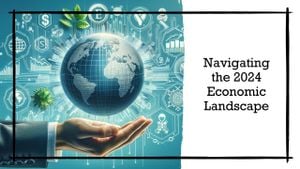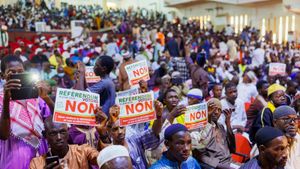The political scene in Scotland has recently become increasingly dramatic, highlighting deep fractures within the Scottish National Party (SNP) and new leadership challenges arising among the Conservatives.
At the forefront was the recent expulsion of SNP parliamentarian John Mason, who chose not to fight his dismissal after he posted on social media his view against labeling Israel’s actions as genocide. This act raised eyebrows and showcased the growing anti-Israel sentiment within the SNP, leading some critics to suggest Mason's ousting was less about principles and rules and more about appeasing the party's more extreme factions.
On the same note, Angus Robertson, another senior player within the SNP, faced backlash for meeting with the Israeli ambassador, provoking renewed calls for his resignation. The stark reality of this situation is illustrative of how relations with Israel have now become more contentious than interactions with traditional allies within the UK.
Critics argue this trend indicates a troubling shift within the SNP, with visceral resentment toward Israel taking root as party loyalty appears to boil down to adherence to specific ideologies rather than diplomatic pragmatism.
Meanwhile, the Scottish Conservatives, under their new leader Russell Findlay, are also wrestling with significant ideological shifts. Findlay, elected following Douglas Ross's resignation, delivered his inaugural keynote speech, where he boldly announced plans to reassess long-standing party policies. His address highlighted the need for fundamental reforms, particularly targeting what he termed Scotland's "freebie culture".
Free prescriptions, baby boxes, and universal tuition fees were among the policies Findlay placed under scrutiny. He contended these initiatives often come with hefty price tags and claimed they contribute to what he described as "gimmicks and cheap headlines" devoid of tangible benefits.
Findlay is adamant about creating change, insisting nothing is off the table, including the controversial free tuition policies, questioning their necessity, especially for wealthier individuals. He stressed the importance of re-establishing trust with the electorate, declaring, "Holyrood has not lived up to its potential; it has become an echo chamber for posturing and preening student politics."
The newly minted leader advocated for reduced taxes, seeking to eliminate the middle-income tax rate of 21p. He remarked, "It's not progress to pick the pockets of Scotland’s teachers, nurses, and police officers – leaving them worse off than they would be elsewhere in the UK."
The SNP, faced with these challenges, continues to evolve but not without its own set of trials. David Torrance, SNP MSP, defended the party’s approach, emphasizing their commitment to prioritizing investments to make sure all citizens have access to necessary resources without financial barriers. A significant point of contention remains the tension between two political factions. The SNP’s internal disagreements—centered around leadership directions, relationships with minority groups, and its overarching stance on independence—remain unresolved, fraying party unity.
The party has to grapple with historical baggage, especially considering its transformation from fringe politics to notable influence under Alex Salmond, who previously succeeded in driving the Scottish independence cause. He was remembered as one of the most significant figures within the SNP, leading the party to its first majority government and making independence conversations mainstream.
Alex Salmond’s contributions to the SNP continue to be weighed against contemporary realities. He recognized the importance of creating bridges with Labour, pushing for devolution rather than direct pathways to independence. The challenge for current SNP leaders remains just how far they can stray from Salmond’s legacy without losing their core identity.
Yet the turmoil doesn't end here—Scotland's political canvas is now painted with more uncertainties than ever before. Leaders will need to steer through the turbulent waters of public opinion, party loyalty, and national aspirations, especially with heightened scrutiny on their policies. How well each party addresses these growing pains will determine their political fates moving forward, especially as Scotland seems poised for another electoral shift.
Both the SNP and the Conservatives find themselves at crossroads, testing their ideologies, addressing their foundational policies, and, perhaps most critically, working to capture the attention and trust of the Scottish populace.
While the future remains unclear, what's certain is the necessary navigation of Scotland’s political landscapes, fraught with challenges and opportunities for those daring enough to take the reins. Only time will tell how well these leaders can adapt and what the outcomes will mean for the nation’s political fabric.



